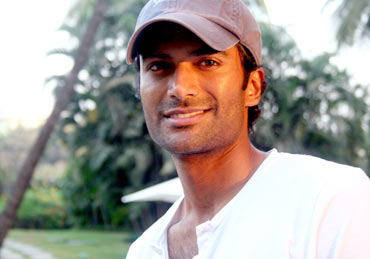
In decades past, Indian-origin actors in Hollywood were relegated to narrowly-defined, cliched roles like nerdy doctors, penny-pinching store owners and the occasional terrorist.
And while that still largely holds true, a new generation of Western desis is challenging this convention.
35-year-old Indian-American actor Sendhil Ramamurthy leads that charge.
One of the stars of hit US drama series Heroes -- he plays geneticist Mohinder Suresh -- Ramamurthy has become a household name in America. And not as a religious extremist or an object of cruel school-yard pranks or a guy with the over-the-top Indian accent.
Quintessentially tall, dark and handsome, Ramamurthy's a true South Asian sex symbol, and has twice been named to People Magazine's annual '100 Most Beautiful' list. (Sorry, ladies, he's happily married to Polish-born British actress Olga Sosnovska. They have two kids, a daughter and a son.)
Now, partially in an effort to reconnect with his heritage, Ramamurthy -- an American born in Chicago and raised in San Antonio -- is actively seeking roles in Indian cinema. But not just any roles, as he's quick to specify.
"I've wanted to work in India for some time now. I've been looking for something to bring me here," he explains. "But the right script, the right role, just hadn't come along. And I didn't want to compromise at all on that point."
Then, last August, 99 directors Raj Nidimoru and Krishna DK flew to Los Angeles to meet him, for a part in the full-length version of Shor, a title for which they'd already shot a 14-minute short film. He immediately fell in love with the story, as well as the directors' style, and signed on, without having read the script.
"I knew this was the right move," he explains. "Everything clicked."
rediff.com's Matthew Schneeberger caught up with Ramamurthy at a Mumbai five-star hotel, where he's staying while shooting in the city for Shor, which is being produced by Ekta Kapoor's Balaji Telefilm's new Alt Entertainment division.
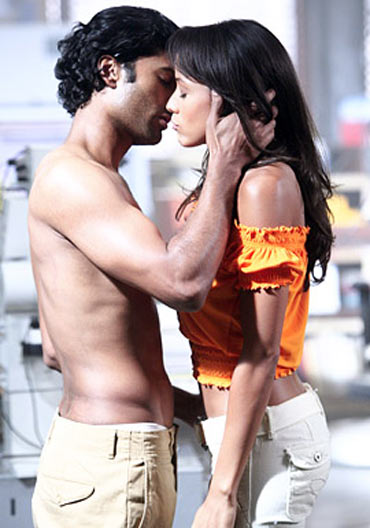
Ekta Kapoor is known as the queen of saas-bahu serials. But Shor is obviously very different. Tell us about the film.
It's a gritty thriller drama, set in contemporary Mumbai. And it gets right into the heart of the modern urban Indian experience. No songs and dances.
The film has three separate but interrelated story-lines, of which two are in Hindi and one in English. Mine is in English.
That's good for me because I don't know a word of Hindi. I can speak Kannada, as my family comes from Bangalore, but Hindi is completely new to me. So I only have about 15 words of Hindi dialogue, which I've put on my iPod, so I can keep them on loop, listening and practising.
I play a young, privileged NRI (non-resident Indian), who was born in India before moving to the West. Now he's come back to Mumbai, and wants to start an NGO, to help those less fortunate. Tusshar Kapoor and (British actress and Miss Great Britian 2006) Preeti Desai are my co-stars.
I can't say too much without revealing some of the plot. But it's a very exciting film with a fantastic climax.
From what I understand, the Alt Entertainment division is a new direction for Ekta, and adds a new component to the Balaji brand. It will focus on promoting young and upcoming Indian directors, in a conscious effort to create cross-over films that can appeal to both Indian and international audiences.
I think Shor definitely has those characteristics, and is a great candidate for becoming a cross-over hit.
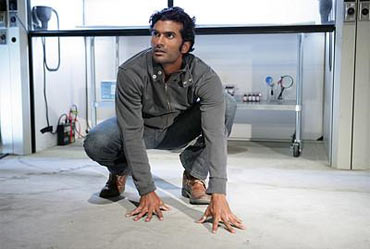
How has shooting gone? What's it like working in Bollywood as compared to Hollywood?
Shooting here has been an entirely new experience. It's chaotic, and definitely not what I'm used to. While Hollywood seems much more organised, here everything manages to fall into place and come together at the last minute. But you can't detract from what they're doing, because it works.
Far and away, Bollywood produces more movies than anywhere else, produces some truly great films, and has a global audience. So they obviously know what they're doing.
As for Mumbai, shooting here is difficult, but also full of opportunity. There are just so many people, and so much going on, that it takes a lot of skill and a good bit of luck to get the perfect shot. It can be frustrating, and there have already been times when I've been ready to throw myself in front of oncoming traffic. But that wouldn't do anything because the traffic isn't moving!
Additionally, where we've been shooting (near shanties in Versova, suburban Mumbai), not only was it hard to shoot logistically, it was also difficult to see so much poverty. But I've realised that, as hard as their lives are, they're happy. They're smiling. They don't want your pity. So it's been a great learning opportunity for me too, as it's unlike anything I've ever experienced.
But we're now in a groove as far as shooting goes. And, while it's still early, I've seen some of the material: Simply gorgeous. Full of colour and texture. Raj and DK are geniuses.
I'll be here through January 26, and then I'm off for the Sundance Film Festival, for the premier of It's A Wonderful Afterlife (a Gurinder Chadha romantic comedy, starring Ramamurthy). They had to condense my shooting schedule because I'll be leaving early, which means my time here has been really hectic. I haven't really had a chance to see the city, or even to take a second to breathe. Today (this interview was conducted on January 19) is my first day off, and I'm spending the whole day doing interviews with the press.
How have you been received here in Mumbai? By fellow actors? By the man-on-the-street?
Everyone has been very welcoming and kind.
And, surprisingly, people know me. Coming here, I didn't know what to expect. I knew Heroes was on TV in India, but I didn't know what time it aired or if it was on a major channel. Turns out, a lot of people watch it! Just the other day, I was out by the pool at the hotel, and an Indian woman came up to me and congratulated me on my success, and said how much it meant to her to have an Indian on prime-time television in the US. While I've been out shooting, people have come up to me to talk about Heroes. It's all been very humbling.
As for people in the entertainment industry here, they've been great. Ekta threw a party for me soon after I arrived, and it was very humbling. People were familiar with my work, and had very complimentary things to say. Plus, I had the opportunity to meet a lot of people.
Also, it was interesting to be surrounded by chocolatey-looking people. At these types of parties in Hollywood, I'm often the only brown guy. Yet, the party still had similar vibes to a Hollywood party. The fraternity is the same. The conversations are similar -- about scripts, roles, directors to work for, etc.
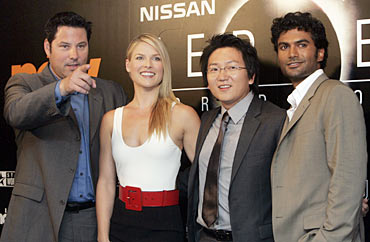
Could you see yourself shifting entirely to Indian cinema and living here full-time? Would you ever do a Bollywood masala film, with song and dance?
The way I see it, right now, I will keep one foot in Hollywood and one in Bollywood. As an actor, it's very important to keep your options open. So I'm happy to work in India. I'm happy to work in America. Actually, I'll work anywhere, provided the script is right. For me, it's all about the script.
As for song-and-dance Bollywood, I can appreciate that kind of film, and I'd never say never. It's just that right now, it's not what I'm looking for. I've been offered it before, but not exactly what I wanted to do. I'm glad I waited, too. Because the whole experience with Shor has proved to be worth it. Again, though, never say never [laughs].
As for living here, I don't think I would. Right now I live in Los Angeles, for Heroes. But New York and London have a special vibe that best suits me. I'd like to end up in one of those places.
You were a pre-med major in university, hailing from family of doctors. Why did you suddenly switch to acting? How was that received by your parents? Had you ever shown interest in acting before?
Well, to be honest, I hated medicine. I hated hospitals. I hated everything about it. I would have been the worst doctor ever. I think that, unconsciously, I was looking for a way out. I felt trapped. Sure, I got good grades, and it might have seemed like I was ready for med school. But I realised that the life just wouldn't work for me.
As for acting, it was a total accident.
In order to fulfill an arts credit that I needed to graduate from university, I took an intro to acting class in my junior year. At the time, acting wasn't even on my radar at all. Growing up, I just played tennis. I wasn't into television or movies. It was the furthest possible thing from my mind.
So I took this class, and ended up skipping most of the sessions. Like I said, I had no interest in it. But as part of our final grade, we had to complete an audition for a school production, and have a sheet signed to prove we actually went out and tried. So I went and tried out for a part, without giving it a second thought. But I got chosen!
Immediately, I told the casting director that I wasn't an actor, that I didn't think I could do it. But he said, 'Okay, sure, I can fill the part. Don't worry about that. But this is college. You're young. You're supposed to be experimenting and trying new things.'
I decided to do just that, and surprisingly, loved every minute of it. The rehearsals. Learning my part. The actual performances. All of it just swept over me, and I knew it's what I wanted to do for the rest of my life. I realised that I could never be happy doing anything else. Soon after, I decided to go to drama school.
Of course, my parents were shocked, which was a fair reaction, because earlier I had never showed any predilection toward acting. None whatsoever.
But they've been absolutely amazing about the whole thing, and incredibly supportive. They paid for my drama school, they came to New York and London for every play I performed in. They've been there every step of the way as I made way into television and film.
Obviously, Heroes was big. At least I was playing a doctor. And I was getting paid ever better than one! Finally, they didn't have to send me money anymore. I was no longer the stereotypical starving artist. It's been nice to treat them, after having them treat me for my entire life. For example, this summer I took my family to Paris. We're all tennis fanatics, so we went for the French Open. It felt great to give back a little.
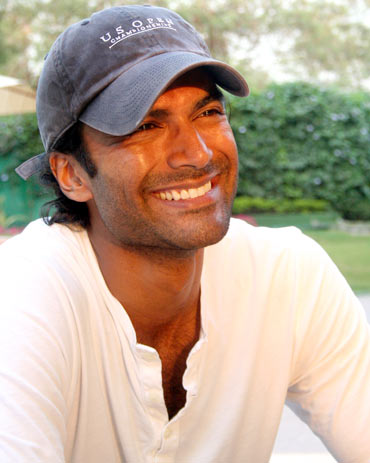
How did Heroes come about?
Earlier, I had been convinced I would only be a stage actor. I never thought I could be a lead on a commercially successful television show because that's not what I saw on television. No one looked like me, or had a name like mine.
At the time, all the roles for South Asians were stereotypical, and not things I wanted to do. You have to fight against those roles. And since I wouldn't do them, my agents wouldn't even send me those scripts. You have to stand up for your principles.
As for Heroes, I really liked the part of Mohinder Suresh. He had a lot of nuance and depth, beyond the normal two-dimensional Indian characters. But the part was written for a much older person, someone in their 50s. That actually helped me because I never really thought I had a shot. They would have to rewrite much of the character if they were to cast me, and I didn't think that was a possibility.
So I just went out totally relaxed, and auditioned. But as they narrowed the field, and I kept getting called back, I realised that I had a real chance. When it was just me and another actor left, and we had to audition for NBC, that's when it really hit me. I was so nervous, sweating through my shirt, drying off my underarms in the bathroom, etc.
Luckily, it happened, and my life changed. But not immediately. After the pilot was shot, I was like, 'So, now what? It's only a pilot. Who knows if it will get picked up?'
But after the first episode aired, and the results came in, that's when I said, 'Wow. This is probably going to be around for a while.'
And suddenly I was everywhere -- on The Tonight Show with Jay Leno, on Regis, on The View, etc. It was all so surreal. All I could think was, 'I grew up watching these shows. What am I doing here on set?'
You've been called a South Asian sex symbol. How does that feel? Do you think you're helping to shift paradigms about what it means to be an Indian actor in the US?
First of all, Indian people are beautiful, and we are sexy. Let's set the record straight.
But I try not to get all wrapped up in those lists and titles and awards. In 2007 and 2008, I made the People's Most Beautiful List. But in 2009 I did not. What happened? Am I not sexy anymore? It's silly to get so involved in that, and let it define you.
When it happened though, it was a combination of flattering and downright strange. People were coming up to me on the streets and in airports. I was reading about how handsome I was.
My wife loves it, and uses it to joke at my expense. It's good that she's there to bring me down some. We've been together since long before all this craziness occurred.
The role of Mohinder Suresh has definitely opened a lot of doors for me, and hopefully other South Asians as well. In the future, I can only hope that Indians will get more and more opportunities to do work with real depth.
But it's been four years now, and I'm ready to move on.
Any advice for aspiring actors?
It's important to remember that I got really lucky. I know many actors who are incredibly talented but can't get that lucky break. Ninety percent of actors are of the 'starving artist' variety. And I've been there. It sucks. If you can do something else, something more stable, and be happy doing it, you should. Acting is only for those who can't do anything else.